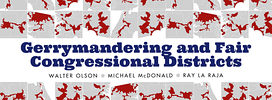Lead Essay
Walter Olson describes why gerrymandering is a serious problem in our political system: Gerrymandering entrenches the incumbents. Those who already have power and influence grow stronger, while new voices and new political movements are shut out of the process. The effort to draw congressional districts in a fair manner, such that the results reflect the will of the electorate, is still young, but Olson outlines some of the traits that any fair system would necessarily have. He also considers why some popular approaches won’t necessarily succeed.
Response Essays
Michael McDonald argues that it’s not difficult at all to build fair congressional districts. A variety of private initiatives have shown that when political incentives are removed, ordinary citizens can use simple, inexpensive software to satisfy a range of general requirements for compactness, community representation, and fairness. It would appear that politics really is the problem.
Gerrymandering is a problem, but the solutions aren’t so clear, says Raymond J. La Raja. Multiple legitimate values are at stake, and sometimes they conflict. There likely is no one optimal solution that we can all agree on. In a situation like that, bargaining becomes a preferred strategy, and La Raja recommends it here. Constituents, politicians, parties, and public interest groups all have a stake in the outcome, and muddling through may not be so bad after all.
Related at Cato
Cato Handbook for Policymakers (2017): ”Redistricting.”
Audio: Robert A. Levy discusses gerrymandering on The Bob Harden Show, October 4, 2017
Commentary: ”How to Stop Politicians from Gerrymandering,” by Walter Olson, April 8, 2017

